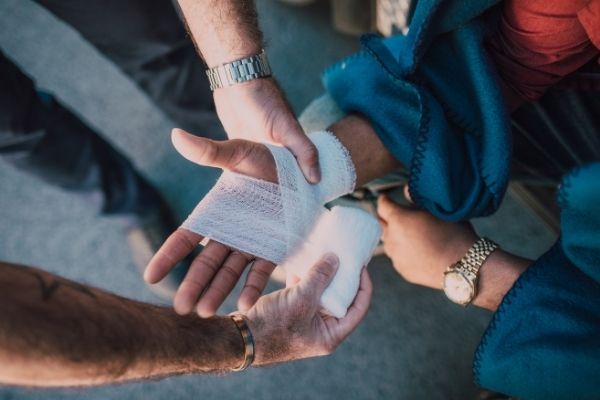Want Us To Contact You?
St. Charles Violent Crime Defense Attorney
Results-Oriented and Trustworthy Representation in St. Charles and Lincoln Counties
Violent crime charges are one of the toughest to fight. However, with an experienced violent crime defense attorney, you will be able to put up an even tougher fight in your defense. Attorney Wayne T. Schoeneberg has been advocating for clients for over 40 years, and he has achieved exceptional successes throughout his career. He takes a personalized approach to strategize effective defenses unique to each clients’ situation, and he will take the time to explain the relevant laws to you and how they may apply to your case. Attorney Schoeneberg will also ask you what result you’re looking for so he can tailor an appropriate defense with that in mind.
For trustworthy, calming, and experienced legal representation in your violent crime case,
contact a violent crime defense attorney who understands! Contact Wayne T. Schoeneberg online or at (314) 708-1000.

Misdemeanor (Third Degree) Assault
There are 3 levels of assault addressed under Missouri law. The least serious level is misdemeanor or third degree assault. A person commits such assault in the third degree if they:
- attempt to physically injure another person or recklessly cause physical injury to another;
- negligently cause bodily injury to another with a deadly weapon;
- purposely threaten another person, causing that person to feel afraid that they are about to suffer serious physical injury;
- recklessly engage in conduct that creates a grave risk of death or serious physical injury to another person;
- intentionally and knowingly engage in physical contact with another that the other finds offensive or provocative; or
- knowingly engage in offensive or provocative contact with an incapacitated person.
Note that the physical injury from an act of misdemeanor assault must be a minor injury like a cut, scrape, or bruise; serious injury like a broken bone or disfigurement could result in a more serious assault charge.
Generally, assault in the third degree is a Class A misdemeanor punishable by up to 1 year in jail and/or a fine of up to $2,000.
Second Degree Assault
The next level of assault is second degree assault, which occurs when a person:
- attempts to kill another person or causes or attempts to cause serious physical injury to another person out of sudden passion due to adequate cause;
- attempts to cause or knowingly causes physical injury to another with a deadly weapon or dangerous instrument;
- recklessly causes serious physical injury to another;
- operates a motor vehicle with criminal negligence and causes physical injury to another while intoxicated by drugs and alcohol;
- recklessly causes physical injury to another by discharge of a firearm; or
- causes physical injury to an emergency vehicle operator by operating a motor vehicle in a criminally negligent manner and in violation of traffics laws.
Second degree assault is a Class C felony punishable by up to 3-10 years in prison and/or a fine of up to $10,000. The charge may rise to a Class B felony punishable by 5-15 years in prison if the defendant commits second degree assault against “special victims” like a law enforcement officer, corrections officer, emergency personnel, highway worker, or probation and parole officer. If the alleged victim is a domestic partner, the defendant could face charges for domestic assault, whose penalties and sentencing guidelines depend on the severity of the offense.
Note that a defendant may argue for second degree instead of first degree assault charges if they prove that they were in a heightened emotional state (“sudden passion”) provoked by someone else, and thus their actions were being directed by passion rather than reason. They must also show that this was a sudden, unexpected event that caused some uncontrollable emotion.


First Degree Assault
Lastly, the highest level of assault is first degree assault, which occurs when a person:
- attempts to kill another person; or
- knowingly causes or attempts to cause another person serious physical injury.
A first degree assault that results in serious physical injury to the other person is a Class A felony punishable by 10-30 years or life in prison. If the first degree assault does not result in serious physical injury to the other person, then the offense may be charged as a Class B felony punishable by 5-15 years in prison.
Additionally, if the alleged victim of an assault in the first degree is a law enforcement officer, corrections officer, emergency personnel, highway worker in a construction zone or work zone, utility worker, cable worker, or probation and parole officer, the crime is a Class A felony, regardless of injury..
Restitution and Alternative Sentencing Options
In Missouri, any individual convicted of assault – in the third, second, or first degree – can be ordered to pay restitution, which reimburses the alleged victim for any expenses resulting from the crime, such as medical treatment or replacement of damaged property.
In certain circumstances, a Missouri court may decide to suspend an individual’s sentence. They may do this in one of two ways:
- suspending imposition of sentence with or without probation (SIS); or
- suspending a jail sentence and placing the defendant on probation (SES).
If the court suspends imposition of sentence, the court postpones sentencing for a period of time, during which they may require the defendant to meet certain requirements such as no new arrests, participating in psychological treatment, or doing community service. If the defendant satisfies all these conditions during the period set by the court and successfully complies with probation, their charge will be dismissed.
If the court suspends execution of a sentence, they will impose a jail sentence but allow the defendant to serve all or a portion of the time on probation rather than in jail. As with SIS, the defendant must successfully complete probation and any other conditions the court imposes, such as meeting with a probation officer, participating in treatment, maintaining employment, and avoiding further criminal activity.
Remember: if you’re hit with charges that include any of the above, regardless of the severity, you need an experienced violent crime defense attorney who will protect your rights. Don’t leave it chance! Hire the best!
